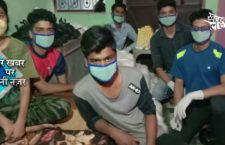A Statement by APWLD
25 March 2020
Chiang Mai, Thailand
APWLD stands in solidarity with the people in the region and across the globe, who are suffering from COVID-19 pandemic and other interconnected crises. Women of all diversities bear the brunt of this crisis as they face multiple and intersecting discrimination, exclusion and violence.
The effect of this public health crisis leading to — and was brought by — the interconnected economic, social and political crisis is becoming clearly evident, and the most marginalised communities are hit the hardest. We have observed the significant lack of access to accurate information, governments’ failure to deliver on their state obligation, including in ensuring transparency or meeting peoples’ basic needs, increased digital surveillance, curfews and lockdown with sweeping measures by military and police forces. With movement restrictions as well as the closure of schools in the absence of adequate support for care services, we have also witnessed how, at home, patriarchal, gendered norms of unpaid care work are being reinforced, as well as rapid surges in domestic violence across the world. There has been a loss of jobs and livelihoods, particularly women who are contract-based and casual, consequently deepening hunger, individual and household debt crises. The pandemic and its consequential crisis is a glaring evidence of how the current system of neoliberal capitalism has failed to deliver peoples’ basic needs, including access to quality public healthcare and universal social protection.
According to the recent initial assessment of the International Labour Organisation (ILO), almost 25 million jobs could be lost worldwide as a result of COVID-19, with the consequent loss of income and social protection (for unprotected workers) as well as a significant increase in working poverty. Majority of women workers in Asia and the Pacific work in the informal economy as agricultural workers, domestic workers, home-based workers and street vendors, who have no access to social protection to begin with. Women make up about half of international migrants, and domestic work constitutes the single largest employment option for women migrant workers. Furthermore, women make up 70 percent of health and social sector workers, who are in a higher risk in the COVID-19 pandemic.
As measures to respond to this level of crisis, the World Bank and International Monetary Fund, announced their neoliberal response in the form of new ‘emergency loans’ targeting poor countries where the health systems are the weakest and people are most vulnerable. In fact, following structural adjustment programmes, many health care and other essential services such as education and water in the region have been a target for ‘profit making’ and subsequently privatised: precisely why so many women and marginalised communities are falling through the gaps at the moment. Some governments, including the US and Japan, are prioritising protecting corporations through corporate bailouts. Some measures have been disproportionate and fundamentally discriminatory, such as the case when the Labour Department of Hong Kong appealed to foreign domestic workers to stay with their employers during their rest days in order to reduce the risk of the virus spread in the community; or the implementation of “lockdowns” without any measures of social safety nets, posing significant risks to refugees, internally displaced persons, urban poor communities and other extremely marginalised sectors, leaving ‘no food on the table’. Further, politically motivated sanctions, continuation of war on certain countries as they are hit with the pandemic may tantamount to genocide. We condemn any repressive measures being used by autocratic states such as media censorship or declaration of emergencies with heavy military presence in violation of international human rights obligations, at this time of crisis.
Women must be a part of decision-making in national budgeting processes, especially when urgent fiscal policies are made to respond to this COVID-19 crisis. The responses must be formulated with the aim to reduce inequalities, redistribute wealth and achieve human rights. For that, structural change is undoubtedly crucial. To list a few, it requires debt work-out and/or cancellation, elimination of illicit financial flows, end of tax havens and tax holidays for corporations, as well as global taxation for harmful industries. It needs to stop prioritising corporate well-being over human and environmental rights including the elimination of all corporate bailout packages, urgently develop and distribute COVID-19 prevention and mitigation measures for free for all, ensure social safety nets for all, and move towards nationalisation of all privatised essential public services. The current unequal ‘global wealth’ has been generated and accumulated through colonial and neoliberal policies imposed on the peoples of the Global South.
The current crisis is a reminder to the long-fought demands of feminist and peoples’ movements for Development Justice and an opportunity to realise the elimination of wealth, power and resources inequalities between countries, between rich and poor and between men and women. We see the urgent need to seize this moment and galvanise our collective power to realise human rights and fundamental freedoms, especially our rights to quality public services including universal public healthcare services, universal social protection such as unemployment support, social housing and universal basic income. The world has sufficient wealth to execute this, and it only requires the political will for implementation. The COVID-19 crisis requires a global-level collective action and coordinated response to overturn the current dominant rules, and rewrite one that is feminist, based on the principles of human rights, historical responsibility, accountability, international cooperation and solidarity. Feminist and peoples’ movements must be at the centre and lead this pathway.
This statement has been issued on behalf of Asia Pacific Forum on Women, Law and Development (APWLD), a leading network of feminist organisations and grassroots activists in Asia and the Pacific. Its 248 members represent groups of diverse women from 27 countries in Asia Pacific. Over the past 33 years, APWLD has actively worked towards advancing women’s human rights and Development Justice.
APWLD is concerned with the response by governments on COVID-19 which highlights the failure of neoliberal capitalism. Public health is a feminist issue and we strongly feel the need for feminist global solidarity to fight this. They have issued a statement in this regard, which we’re re-publishing with permission.
To read the Hindi version of this statement, click here. For regular updates from Khabar Lahariya’s coverage of the pandemic, subscribe to Covid19, The Last Mile.
हिंदी में पढने के लिए यहाँ क्लिक करें

